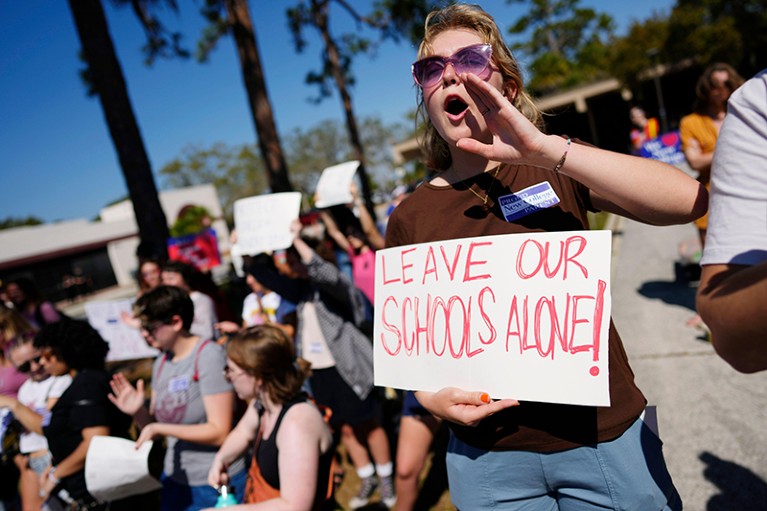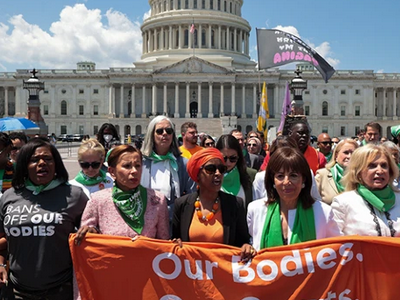
Students at New College of Florida, Sarasota, protest last year at plans, now in place, to change the university’s programmes on diversity, equity and inclusion.Credit: Rebecca Blackwell/AP/Alamy
A survey of faculty members working in US southern states shows that a significant majority frequently witness or experience political interference that affects morale and is causing many to look for positions in other regions or to leave academia altogether.
The survey, which ran in August 2024, was distributed mostly by the southern regional chapters of the American Association of University Professors (AAUP), and garnered responses from 2,924 self-selected participants. Of these, 51% identified as female, 17% identified as non-white and more than 60% held tenured positions. The survey found that nearly 60% of respondents could not recommend their state as a desirable place to work. Nearly 50% said that politics and policy changes had reduced the numbers of job applicants to their institutions.
“This is an issue that faculty members are worried about, and that’s going to become a bigger problem for state institutions in large parts of the country,” says Amy Reid, who until August led New College of Florida’s gender-studies programme in Sarasota. She is now working with the non-profit organization PEN America, based in New York City, as manager of its Freedom to Learn programme. (Reid’s move to PEN America came after board members appointed to New College by Florida’s Republican governor, Ron DeSantis, voted a year ago to abolish the university’s 30-year-old gender-studies programme.)

Are divisive US politics repelling international early-career scientists?
According to a report by the American Federation of Teachers and the American Association of University Professors, former US president and current president-elect Donald Trump laid the groundwork for such political attacks on university campuses when he called out “divisive concepts” such as diversity, equity and inclusion in an executive order that he issued in 2020. A conservative wave of state-level politics, led mostly by Republicans, has taken hold in many southern states. State legislatures have enacted or proposed laws targeting tenure and the teaching of controversial topics such as critical race theory, to dismantle diversity, equity and inclusion efforts on state-funded university campuses. There has even been a proposal to display the Bible’s Ten Commandments in university classrooms.
The AAUP survey, distributed by e-mail and social media to faculty members in 12 southeastern states, revealed that around 30% of faculty members there were looking for jobs outside the region. Reasons given included diminished academic freedom and lack of shared governance, state restrictions or bans on abortion, erosion of support for policies on diversity, equity and inclusion, threats to tenure and harassment or doxxing — the publishing of personal information, such as addresses and mobile numbers, on the Internet without consent.
“Multiple faculty members at my institution have been doxxed and harassed, including by elected officials,” wrote one respondent, a female instructor in Texas. “This makes it difficult for me to do my job or feel safe on campus or at home and honestly just live my life.”
Threats to morale
The issues raised by survey respondents affect faculty members regardless of whether they are looking elsewhere or staying put. The state of Georgia, for example, gutted tenure protection in 2021. The University System of Georgia (USG), which governs public higher education in the state, made changes to post-tenure review that make it easier to fire tenured faculty members, according to the AAUP.
The rationale for the changes was to “ensure accountability and continued strong performance from the system’s tenured faculty members”, according to a statement by the USG. The AAUP condemned the move, censuring the USG for stripping away academic freedom.

Universities axe diversity statements in wake of US Supreme Court ruling on affirmative action
“It has definitely affected morale,” says Joseph Fu, a mathematician at the University of Georgia in Athens. Fu didn’t take the AAUP survey but says there’s a feeling among faculty members of being disrespected and unprotected. He’s close to retirement, so he’s not concerned about his own career, but he worries about younger colleagues. “There’s a general scepticism about the administration and the extent to which they have our back.”
That view aligns with the finding that 55% of survey respondents felt that their institution’s administration was not defending tenure or academic freedom.
Hollie Swanson, a pharmacologist at the University of Kentucky College of Medicine, in Lexington, says that university administration staff changed the faculty senate from a decision-making body to one that serves only in an advisory capacity in June. Among the reasons for the change was that advisory-only senates were found to be the “clear and prevailing norm” at other institutions that the administration looked at, according to University of Kentucky spokesperson Jay Blanton. He also says that staff and students had not felt fully represented by the previous faculty senate.
The change, however, has bred mistrust and wariness among faculty members. “If your voice is only advisory, it can be easily dismissed. If you don’t have decision-making power, then your voice is not effective,” says Swanson.






